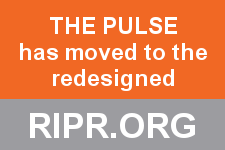A little story about RI Public Radio and the HCA
The Hospital Conversions Act (HCA), the law surrounding state approval of hospital mergers, is getting some extra attention these days. We heard about the HCA in the case of Landmark Medical Center‘s “incomplete” application to merge with Steward Health Care System and it’s likely we’ll hear about it when Westerly Hospital courts a new owner.
If you want to understand that process, here’s a cheat sheet I wrote up earlier in the year.
But this post isn’t about that. It’s about the little known connection between the Hospital Conversions Act and Rhode Island Public Radio. The law played a key role in protecting (and later slowing down) my employer and your favorite radio station.
It all started in 2004, when Boston University wanted to sell WRNI to make some much needed cash. Folks in Rhode Island who’d donated millions of dollars to bring public radio to the Ocean State opposed the sale, arguing that they too “owned” WRNI and Boston University had no right to get rid of the station.
Enter Attorney Don Wineberg. At the time, he was just an avid listener with an expertise in health care law. He tells me when he heard Boston University wanted to sell WRNI, he realized there might be some legal precedent to prevent the sale.
I knew from my experience as a health care lawyer that non-profit organizations can’t just abandon their mission unless their mission has either been satisfied or is no longer achievable… this might be out there as a way to slow down or even challenge the sale.
Wineberg says he called a friend who was on the board for Rhode Island Public Radio and told her about his idea. Soon after, Wineberg joined the board.
We started to involve the Attorney General’s office in trying to slow down or attack the transaction. They felt while they had ample authority to investigate the sale, they were less certain about their actual legal technical authority to challenge the sale.
That’s when Wineberg had an idea- why not use a law governing the sale of non-profit hospitals to slow down the sale of a non-profit radio station?
It wasn’t really a long stretch to see that the charitable nature of public radio stations was vulnerable and susceptible to the same protections as hospitals.
He went to work rewriting the Hospital Conversions Act with WRNI in mind. The major difference? The HCA says the Attorney General and the Director of the Department of Health have the right to approve or reject any hospital sale or merger. But in the case of a public radio station, only the Federal Communications Commission (FCC) has that power. So Wineberg made a little modification.
We gave the Attorney General the right to recoup all of the charitable dollars that had ever been given to a station.
Wineberg says he made some other minor changes and then quietly pushed the “Public Radio Conversions Act” through the General Assembly. The law passed that year. Wineberg says the threat of losing its donations was enough to make Boston University reconsider the sale.
… since millions of dollars had been given by Rhode Islanders to Boston University and the stations were worth less than millions of dollars, it became immediately clear to BU that even if they sold the stations, they might not be able to net any money from the sale. The result was getting BU to talk seriously with us [WRNI’s board] about buying the station, which was our main goal.
And that’s what the board of directors eventually did. The group eventually worked out a deal with Boston University to buy the station and form what’s now known as Rhode Island Public Radio. But nothing exempted the WRNI board from the new Public Radio Conversions Act. Don Wineberg and the rest of the public radio supporters spent the next 18 months jumping through legal hoops they created. Did he ever regret creating these roadblocks only to get caught in them himself?
No, because we were able to work around it. We entered into a management agreement with BU that allowed us to take over the operating responsibility, both editorially and financially for the station. So even though it was technically still owned and controlled by BU, we were able to do what we needed to do to promote the station on a day to day basis. So while I wish it would have been faster, it was ok.
Does he have any advice for Landmark Medical Center as it goes through the hospital version of the Public Radio Conversions Act?
The best advice, and I give this to all clients who are involved in regulatory processes, is give the regulators every scrap of information that you possibly believe they might be interested in. Because, that creates the trust on the regulatory side that you’re not trying to hide anything and therefore gets the deal done a ton faster than if they’re trying to squeeze every little bit of financial information out of you. And that means that if you really want the transaction to go forward, you’ve got to be prepared to publish the CEO’s salary, publish their severance package, and let the sun shine on everything. That’s the way to get it done the fastest.
Who knew Landmark had something to learn from our scrappy public radio station?

Don Weinberg has been a real asset to the RI legal community and a diamond in the rough for public radio. When I was young, I travelled far and wide without leaving my home. All I had to do was turn on the radio. Now that I have actually travelled far and wide I get to color these memories with vivid reports from all over the globe via public radio.
Glad you liked the post Bruce! Maybe we should profile YOU on the blog!